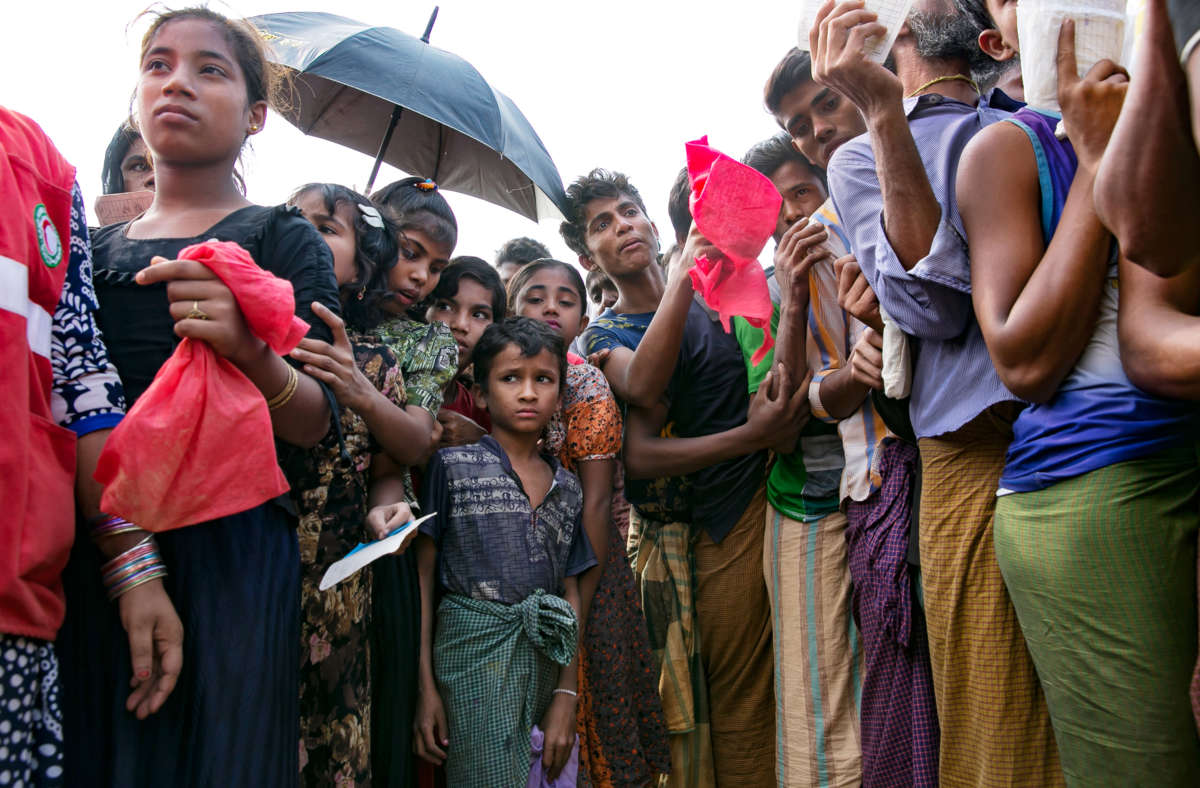Support justice-driven, accurate and transparent news — make a quick donation to Truthout today!
Three years ago, Donald Trump instituted a racist, xenophobic Muslim ban prohibiting people in predominately Muslim nations from traveling to the U.S. On February 21, a new expansion went into effect, blocking access to immigrant visas to people from Burma (Myanmar), Nigeria, Eritrea and Kyrgyzstan, and diversity visas to people from Sudan and Tanzania.
This expansion is expected to have devastating economic and humanitarian consequences. It will depress economies throughout Africa. Family separation will be exacerbated as families will not be allowed to unite in the United States for the foreseeable future. The U.S. government will continue to fuel xenophobia by showing the world that it considers racist and anti-Muslim foreign policy acceptable.
But of all of the ban’s abhorrent impacts, one of the most egregious is its effects on the Rohingya, a persecuted minority in Burma who were the victims and survivors of a genocide in 2017, and by all indications, may face another impending genocide.
In 2017, at least 6,700 Rohingya were killed in a single month by the Burmese military — targeted for their ethnicity and for being Muslim. At least 730 children died in that month from being shot, burnt or beaten to death.
The U.S. has ignored the plight of the Rohingya for decades, making only half-hearted and inconsequential attempts to prevent atrocities and hold accountable those complicit in genocide. Trump’s Muslim ban adds insult to injury by blocking one of the last pathways the Rohingya have to living a life with dignity and free from violence. The U.S. must end the Muslim ban and reverse its inhumane immigration policies to treat the Rohingya — and all affected by the ban — with justice.
The Ban’s Deadly Effects
The Rohingya are in a perilous position. For the past three years, Burma has ranked in the top 30 countries of the world most likely to see a mass killing. Thousands of the more than 900,000 Rohingya refugees in Bangladesh are living with the physical and psychological trauma of surviving a targeted sexual violence campaign at the hands of the Burmese military. They face the daily threat of forced repatriation from Bangladesh to Burma to contend with the same violence that has not stopped since 2017.
But the U.S. is ignoring these dangers and continues to institute policies that harm the Rohingya. The expansion of the Muslim ban prohibits them from obtaining immigrant visas, which are often a path to permanent residence and family reunification in the U.S.
This move is not an isolated policy. The expansion is also part of a larger, concentrated campaign by Trump to deny vulnerable individuals around the world refuge and safety. This year, the U.S. refugee admittance cap was set at an all-time low, while access to asylum continues to be nearly impossible. This acutely affects the Rohingya. In 2015, more than 2,500 Rohingya refugees were admitted into the U.S., but by 2019 that number had dropped to a little over 200.
The United States is trapping the Rohingya in a state of perpetual violence and conflict by pursuing both failed immigration and foreign policies. Just months after the 2017 genocide, the Burmese military was invited to Cobra Gold, a U.S.-led military exercise event with Asian-Pacific countries. They were invited again this year. By not actively pushing back on Thailand’s granting the Burmese military observer status in the exercises, not only is the U.S. denying the Rohingya safety, it is also giving genocide perpetrators tools to continue their campaign of violence. Trump’s xenophobic and racist rhetoric and actions have indicated that there will be little to no consequences for perpetrators of state violence, and emboldens other countries to follow suit.
U.S. Policy Must Change
We must change U.S. policies on migration and immigration and end military cooperation with Burma to protect the most vulnerable populations in the world. The NO BAN Act, currently in the House of Representatives, would begin the much-needed transformation of U.S. immigration policies. The Act would end the Muslim ban and ensure the Rohingya and all who have been impacted by the ban can be reunited with their families and pursue a better life.
But we can’t stop at just ending the Muslim ban. We need to completely revamp policy toward migration and immigration — from expanding the refugee resettlement program to ensuring a minimum number of refugees can be accepted every year, to addressing the root causes of displacement by supporting efforts to address climate change, violence and conflict reduction.
The U.S. must open its doors to migrants and give them justice. This could include following in the footsteps of the recent ruling from the International Court of Justice which called for protection of the Rohingya from future violence. This is a historic and critically important step to hold the perpetrators of genocide accountable for future atrocities, and should be emulated by current and future U.S. administrations by supporting international courts and mechanisms that bring communities justice.
Trump’s migration policies disproportionately harm the most vulnerable people in the world — nowhere is this clearer than in its banning of the Rohingya. Providing a pathway to a safe home would allow the Rohingya to reclaim their narrative and build their lives in safety as survivors, not just victims. In the case of Burma, it is clear: Our policies must change, and they must change now.
Press freedom is under attack
As Trump cracks down on political speech, independent media is increasingly necessary.
Truthout produces reporting you won’t see in the mainstream: journalism from the frontlines of global conflict, interviews with grassroots movement leaders, high-quality legal analysis and more.
Our work is possible thanks to reader support. Help Truthout catalyze change and social justice — make a tax-deductible monthly or one-time donation today.
